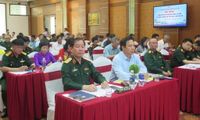Dr. Sahar Al-Sunbati, the head of the National Council for Childhood and Motherhood, recently participated in the inaugural meeting aimed at supporting the health of Egyptian women through safe women's clinics within primary healthcare facilities. This initiative, organized by the Ministry of Health and Population, seeks to enhance healthcare access for women across Egypt.
During her opening remarks, Al-Sunbati highlighted the council's commitment to combating various forms of violence and danger facing children through a national child protection system. This system operates via the Child Helpline (16000), which serves as a comprehensive framework that combines prevention, protection, and intervention to address any threats to children's safety. The helpline is available 24/7, receiving reports and complaints related to child safety.
In 2024, the helpline received a staggering 21,424 reports, averaging about 59 reports per day. This figure represents a significant increase of 15.5% compared to 2023, where 18,805 reports were logged. Among these reports, 18,805 (approximately 88%) were categorized as children in danger, while 2,619 (12%) were telephone consultations. The highest number of reports came from the governorates of Cairo, Alexandria, Giza, Sharqia, and Daqahlia.
Al-Sunbati also addressed the council's efforts to eradicate the harmful practice of female genital mutilation (FGM). Since the establishment of the National Committee for the Elimination of Female Genital Mutilation in 2019, in collaboration with the National Council for Women, the council has worked tirelessly to change public perceptions and eliminate this practice. The percentage of FGM has decreased from 21% in 2014 to 14% in 2021, with the ambitious goal of achieving zero cases in Egypt.
Furthermore, the council has played a pivotal role in amending the penalties related to FGM under Law No. 10 of 2021. This law imposes stricter penalties for individuals who perform FGM, emphasizing the seriousness of this issue. Legal actions are being pursued against reported cases of FGM received through the Child Helpline, successfully preventing some instances from occurring.
In 2024, the council documented 93 reports of FGM. Among these, 32 cases were prevented through the council's intervention, while 61 cases had already occurred, indicating that FGM constituted 2.1% of all reports of physical danger. The governorates with the highest reports of FGM were Sohag (19 reports), Qena (17 reports), and both Cairo and Assiut (8 reports each), followed by Sharqia with 7 reports.
Al-Sunbati also discussed the council's ongoing efforts to combat child marriage. In 2024, the council received 250 reports of child marriage, representing 7% of total exploitation reports. The council successfully intervened to prevent 190 child marriages, achieving a 74% success rate in halting these cases. Legal measures were taken against instances where marriages had already occurred, with the most affected governorates being Sohag, Daqahlia, Assiut, Sharqia, and Minya.
To further address the issue of child marriage, the council is preparing to launch the "Ghazl Banat" initiative, which aims to oppose child marriage by teaching girls in community schools traditional crafts to revive cultural heritage.
Al-Sunbati emphasized the council's readiness to collaborate with all national and international organizations to implement comprehensive plans for protecting children's rights and enhancing economic empowerment for mothers. She expressed gratitude to the Ministry of Health and Population for its ongoing support and fruitful cooperation in promoting child and maternal health.
In her presentation at the meeting, Dr. Hiam Nazif, the Deputy Head of the National Council for Childhood and Motherhood, elaborated on the council's role in combating violence against girls. She highlighted the council's efforts to enhance the legal framework protecting children's rights and the national child protection system, including the Child Helpline's role in safeguarding children.
Dr. Nazif also discussed the legal and psychological counseling services provided by the Child Helpline in cases of violence against girls. She outlined the challenges facing the child protection system and proposed policies to strengthen the national protection framework.
The meeting was attended by several dignitaries, including Dr. Amr Qandil, Deputy Minister of Health and Population for Preventive Medicine, and Dr. Rasha Khidr, Head of the Primary Healthcare Sector and Family Development. Their participation underscores the collaborative efforts being made to improve the health and safety of children and women in Egypt.
The National Council for Childhood and Motherhood remains steadfast in its mission to protect and empower children and mothers in Egypt. Through initiatives like the Child Helpline and various awareness programs, the council aims to create a safer environment for all children, ensuring their rights are upheld and their well-being is prioritized.


